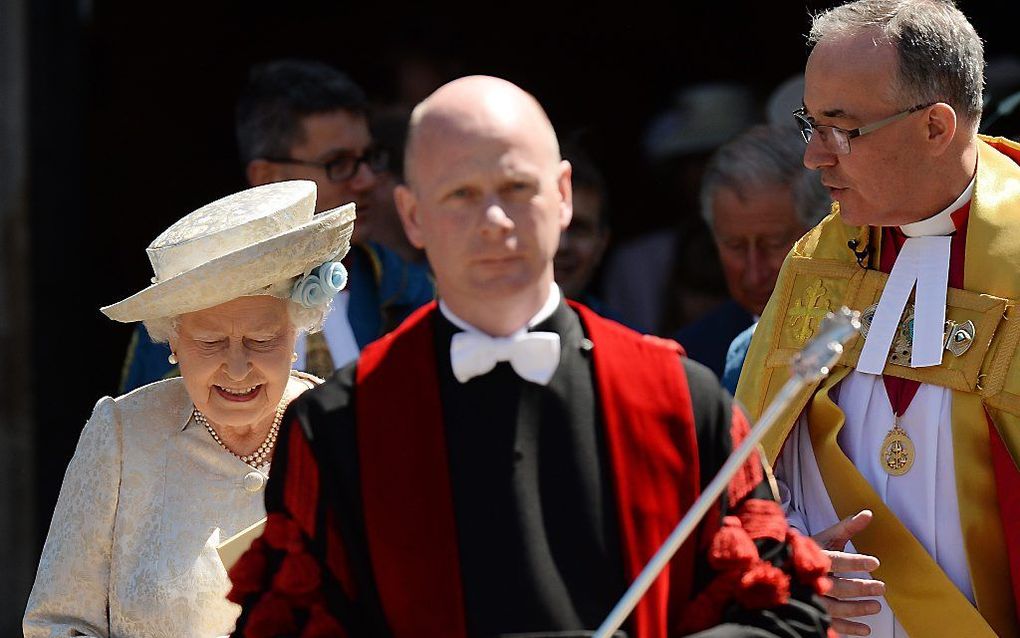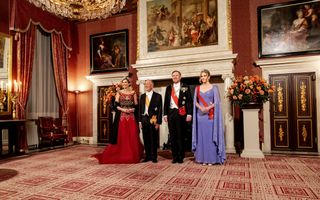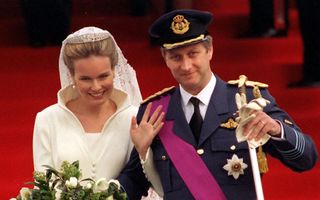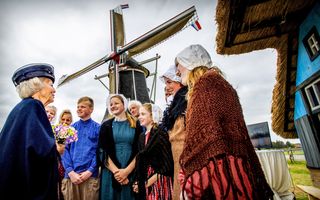Queen Elizabeth 60 jaar op de troon: herdenking in Westminster Abbey
Het is zondag precies 60 jaar geleden dat de Britse koningin Elizabeth de troon besteeg. De inmiddels 87-jarige vorstin herdacht het jubileum dinsdag in een dienst in de Westminister Abbey in Londen.

Op 2 juni 1953 werd ze tot koningin gekroond. 8200 gasten waren aanwezig bij de festiviteiten. Die werden rechtstreeks uitgezonden door een relatief nieuw medium, televisie. Naar schatting 8 van de 50 miljoen Britten in Groot-Brittannië konden thuis kijken en zij kregen samen circa 10 miljoen gasten over de vloer om naar de uitzending te kijken.
Om die dag opnieuw te beleven zullen voor het eerst het volledig opgeknapte televisieverslag van de kroning worden uitgezonden door de BBC. Alle zwart-witbeelden zijn door de televisiestudio’s van de Britse omroep opgefrist.
Volledige tekst preek Justin Welby (Engels)
‘And whosoever will be chief among you, let him be your servant’ (Matthew 20:27)
A nation watched. It was the first time the whole nation had watched anything as it happened. But this they saw. Pomp and ceremony on a rainy, June day, wrapped in time and custom - very British. At its beginning was a moment of deepest meaning we have almost forgotten. The figure at the centre of events, the new Queen, goes alone, not to the Coronation Chair, but past it: to kneel at the altar in prayer. Before her on the High Altar the words “The kingdoms of this world have become the kingdoms of our Lord and Christ.”
We do not know what was prayed. Her Majesty knelt at the beginning of a path of demanding devotion and utter self-sacrifice, a path she did not choose, yet to which she was called by God. Today we celebrate sixty years since that moment, sixty years of commitment.
There was a trumpet fanfare as today, as the Queen arrived with her supporters, but let us resist the splendour of the spectacle for a moment, and focus on what was meant: “Not my will, Lord, but yours be done.”
And following her Majesty’s giving of allegiance to God, others, especially with such equal commitment the Duke of Edinburgh, pledged their allegiance to her.
And here, in the grace and providence of God, is the model of liberty and authority which our country enjoys. Liberty is only real when it exists under authority. Liberty under authority begins, as the Book of Common Prayer puts it, with our duty to God, “whose service is perfect freedom”.
We live in a hierarchy of liberty under authority that ascends to God’s limitless love. As we see in the life of Jesus, with God justice and mercy are perfectly joined, wisdom is unlimited, generosity is unstinting, and love pours out to the whole world in an overwhelming embrace that is offered universally and abundantly.
A nation that crowns its head of state with such a model of liberty under authority expresses commitment to the same glorious values for itself.
In those moments of prayer are symbolised the basis for the greatness of this country. In their silence lies God’s call. In their humility lies God’s authority. In their resulting service lies God’s perfect freedom. What follows is the joy of security that comes from obeying God alone. Such consecration to God is followed by a crown. When we obey God’s call, whoever we are, leading Government or quietly serving our local community, we establish a country that is open-handed and open-hearted, serving others with joy.
In such service we become Britain at its best. We know how to celebrate - as again last year in the Olympics. We know how to comfort and grieve – as on the streets of Woolwich, in the courage of passers-by and police.
Yet we are not always and everywhere at our best. We celebrate today not liberty by itself, which in human weakness turns to selfishness, but liberty under the authority of God. We are never more free, nor better than when we are under the authority of God.
The coronation was an ordination, a setting aside of a person for service. Once anointed, Her Majesty received symbols, symbols so monumental that they are only bearable by the grace and strength of God.
They were symbols of service as well as of leadership and authority. Hear the words spoken to Her Majesty as she received the sword:
With this sword do justice, stop the growth of iniquity, protect the holy Church of God, help and defend widows and orphans, restore the things that are gone to decay, maintain the things that are restored, punish and reform what is amiss, and confirm what is in good order: that doing these things you may be glorious in all virtue; and so faithfully serve our Lord Jesus Christ in this life,
that you may reign for ever with him in the life which is to come.
Small tasks! Tasks that are shared and renewed in a free democracy under authority. The symbols and words point us to our deepest understanding of the nature of power, which is found neither in pomp and circumstance nor in public displays but in radical commitment, single-minded devotion and servant leadership. And for that we give thanks today.
The very nature of being British follows this simple logic. It is founded on liberty under authority. It imitates the example of Jesus who did not count equality with God a thing to be grasped, but humbled Himself and took the form of a slave. In Jesus is seen the greatest servant of all, whose service gives us freedom, whose love is generously offered to each of us.
Her Majesty the Queen is servant of the King of Kings, and so she serves us, as we serve her, in liberty and under authority. It is a system that points to freedom in God, in whose love alone we are fully human, fully free.



